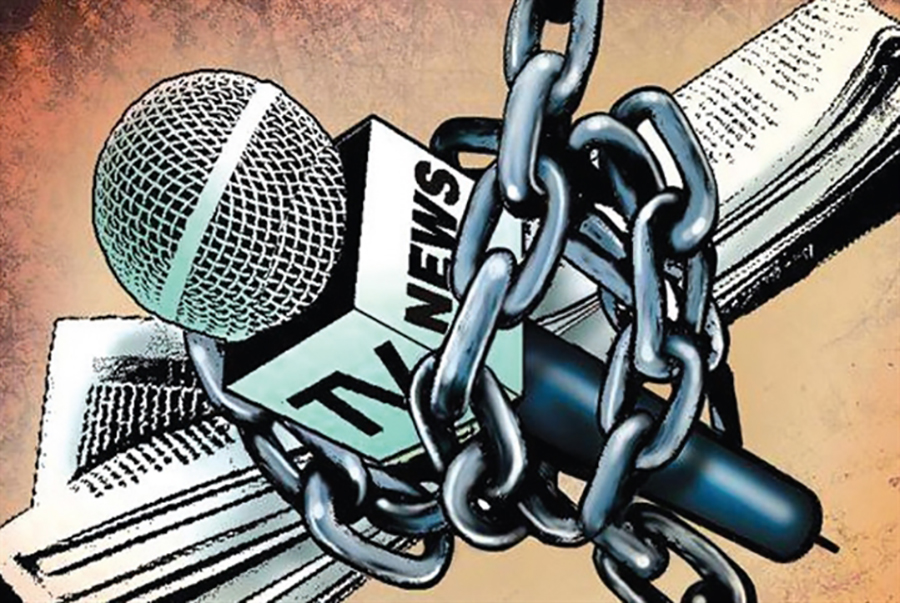
Sudan: A War that Spares No Press
By Youssef Hamad
In 1903, Sudanese people embraced the art of journalism and newspaper circulation. However, just 120 years later, everything related to this industry has been dismantled. In fact, this profession began to deteriorate early on due to the extended years of dictatorship in the country.
As soon as a military coup takes place, it rushes to close down media institutions. Among the numerous arrests of political figures, journalists also face arrests and restrictions in their work.
Finally, after more than 100 years of ups and downs, a brutal and far-reaching war erupted in April for the sake of power, with the army and Rapid Support Forces as its instigators, dealing a fatal blow to what remained of this noble profession.
This war witnessed widespread destruction of infrastructure and buildings in the capital, Khartoum, on an unprecedented scale, unlike anything the country had seen even during the retaliatory campaigns led by colonial powers in response to the killing of Ismail Pasha by Sudanese.
The war began in Khartoum and then spread to other cities and regions. Among the millions of civilians who fled the capital or left for neighboring countries, there were approximately 500 journalists working in newspapers, television channels, and radio stations. The number might be similar for those working in professions closely related to journalism.
As a result of this mass exodus and refugee crisis, Khartoum was declared a city devoid of journalists, and media institutions ground to a halt. The war continued in darkness, with news and accurate information absent from the journalistic scene, creating favorable conditions for a return to the era of media control characterized by propaganda, misinformation, and biased reporting in favor of one of the warring parties.
The total violations during the months of the war, up until now, amount to 239 cases, including 7 cases of journalists or their relatives being killed, 7 cases of gunshot wounds, 14 cases of arrests, 12 cases of threats, and 8 cases of gunfire. All these violations occurred in Khartoum, Darfur, and other regions.
Because of this, more than 20 printed newspapers that used to be published in Khartoum have ceased operations, along with all radio stations and television channels that fell under attack. The armed groups even occupied some buildings, using them as military barracks.
In the early months of the war, armed forces (mostly from the Rapid Support Forces) reportedly targeted the homes of journalists in various areas of the capital, raising concerns of a systematic plan to target them and their properties, prompting them to flee.
Practically, about 70 homes were raided and attacked in May, June, July, and August, according to a report prepared by the Sudanese Journalists Union regarding the state of media freedoms in Sudan. The report stated that violations against journalists and media institutions represented an obstacle to practicing the profession in a manner that guarantees its independence and integrity.
In reality, violations against independent media and journalism in Sudan have been steadily increasing, which has resulted in a decline in press freedom. The period leading up to the outbreak of the war, for example, witnessed increased government control, and security agencies exerting pressure on journalists and media outlets through lawsuits filed against journalists and newspapers, often on defamation grounds.
The Sudanese Journalists Union reported that its members had experienced 55 violations prior to the outbreak of the war, including repeated violations against individual journalists. Additionally, more than 20 injuries from tear gas canisters, arrests, abductions, and malicious lawsuits against journalists occurred during their coverage of the peaceful protests against the October 25 coup.
Economically, the salaries of 1,166 employees of the General Authority for Radio and Television, as well as around 153 collaborators, have not been paid since the institution stopped working on April 15, after being occupied by the Rapid Support Forces. Besides the official television, there are newspapers, radio stations, and channels that have not been able to pay their employees salaries. Other media institutions have either terminated the employment of their workers or granted them indefinite unpaid leave.

